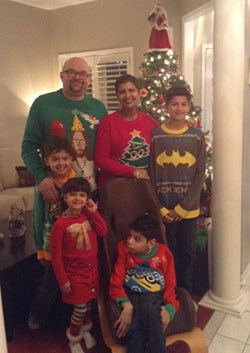SickKids gives gift of sight in time for Christmas
Summary:
For Zachary, Christmas came early this year, when he received the gift of sight at The Hospital for Sick Children (SickKids). On Dec. 7, he became one of the first three patients at SickKids to receive laser refractive surgery, commonly known as laser eye surgery.
A wide range of developmental and health challenges have made it difficult for 14-year-old Zachary Desrochers to connect with his family. In addition to a variety of neurological and gastrointestinal issues caused by Zachary’s rare genetic condition, called congenital disorder of glycosylation (CDG), he is unable to talk or feed himself, and until early December, was nearly blind.

For Zachary, Christmas came early this year, when he received the gift of sight at The Hospital for Sick Children (SickKids). On Dec. 7, he became one of the first three patients at SickKids to receive laser refractive surgery, commonly known as laser eye surgery. Just two weeks after the operation, his dad says Zachary’s world has opened up. Being able to make eye contact allowed Zachary to connect with his parents and siblings in a new way and has transformed his relationship with his family, just in time for the holidays.
The SickKids team is initially offering laser eye surgery to children who cannot wear glasses or contact lenses due to developmental or behavioural issues, and is currently the only Canadian site offering laser eye surgery to this paediatric patient population. Without these devices to help them see, these children become functionally blind, only compounding their behavioural and developmental difficulties. Laser eye surgery can correct the child’s vision, which can immediately enhance their quality of life and has been shown to improve both development and behaviour in this group of children.
“These children have no other options to improve their vision. They have tried and consistently failed to wear contacts or glasses and essentially this permanently blurs their view of the world. Improving the vision of these children can have a huge impact on their quality of life, their behaviour and on their development. It can truly change how they interact with others and the world around them,” says Dr. Kamiar Mireskandari, Staff Ophthalmologist in Ophthalmology and Vision Sciences at SickKids, and co-lead of the Laser Refractive Surgery Program at SickKids.
“Zachary has had little to no vision since he was a baby,” says his dad, Ray Desrochers. “We’ve tried glasses countless times; he would immediately rip them off. It’s only been two weeks since the surgery, but it’s evident that he is seeing, experiencing and processing a whole new world around him. Zachary is nonverbal so how we communicate with him and connect with him is very important. Before this procedure, when we would speak to him, he would look over in our direction, but not make direct contact with us. The most remarkable thing now is when we speak to him he not only fixes on our voices, but he fixes his gaze directly on us and makes eye contact. I feel like I’m connecting with my son on a whole other level.”
Laser eye surgery is a safe and effective procedure that corrects common refractive errors like myopia (nearsightedness), hyperopia (farsightedness) and astigmatism. Refractive errors are problems in the eye that impact how the eye focuses light. The laser reshapes the surface of the eye to provide sharp focus.
For healthy adults, laser eye surgery is a day procedure in a clinic with only anaesthetic eye drops. Because of the medical complexity of the patient population eligible for the operation at SickKids, specialized inpatient hospital care is required. The child must have a general anaesthetic to ensure he stays completely still during the surgery. Availability of this procedure is limited because very few centres in the world offer the combination of advanced paediatric anaesthesia care, as well as surgical, technical and nursing expertise. The surgery itself only takes 15 minutes per eye.
“We are already seeing such positive outcomes from offering this simple procedure to a very complex population of children and teens,” says Dr. Asim Ali, Staff Ophthalmologist in Ophthalmology and Vision Sciences at SickKids, and co-lead of the Laser Refractive Surgery Program at SickKids. “In the short term, our team is planning about 20 cases per year for this specific patient population. In the future, the surgery could also be beneficial for treating a variety of eye diseases in children.”
The Laser Refractive Surgery Program at SickKids was made possible thanks to LASIK MD for its donation of the laser and technical expertise, as well as an Innovation grant from SickKids.

